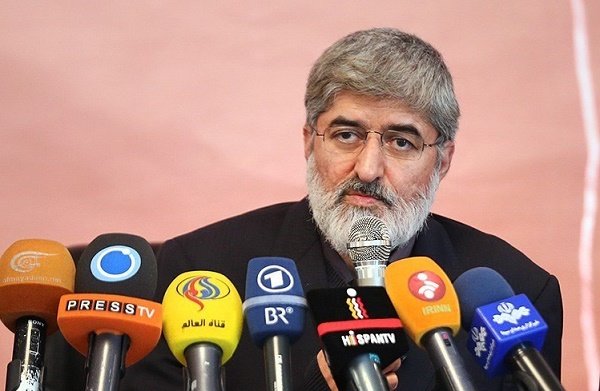Ali Motahari, the major figure of the group of candidates named as Moderates affiliated with President Hassan Rouhani and Reformists, addressed a meeting in the University of Tehran, ‘Academicians’ Demands from the Future Parliament,’ on Monday, where he voiced his positions in some of the most controversial issues regarded by the majority of the candidates as redlines not to be trespassed.
Motahari was one of the few Parliamentarians in the 9th (sitting) Parliament who spoke frankly about the ‘redlines’ in a Parliament dominated by Principlists. He touched upon some of the important unaddressed issues which had been strictly forbidden and tabooed in official addresses by government officials. He believed that the atmosphere of terror and intimidation would deprive the public of its dynamic process of thinking and the rise of the intellectuals and healthy society; Motahari told the meeting that even today, “we have not experienced full-blown democracy, but a democracy which is delimited by Islamic framework.”
On a question of the house arrest and possible hearing in the court of the case of ‘the heads of the seditionists,’ who are considered as heads of 2009 post-election unrest, Ali Motahari believed the house arrest was violation of the Constitution which asserted that imprisoning of individuals without any legal mandate “is illegal and unconstitutional;” “those under house arrest should have access to lawyers and be tried in a qualified court; in 2009 street unrest, the share of the government of the time in fueling the tension and conflict was no less than the party which challenged the results of the elections; the house arrest as a political expediency should not become a popular measure to silence political dissent,” he told the meeting.
“On Shiraz incidents court as well, I clearly felt that the Judiciary was under severe pressures to give verdicts well in harmony with the specific circles’ demands. The attackers received only very mild verdicts which were almost nothing enforceable; however, the organizing student was fined unjustly,” Motahari claimed without providing any evidence.
Motahari supported the Sixth Parliament’s measures of preparing famous ‘twin bills’ on election law and letter written to the Leader of the Islamic Revolution; “the Parliament was an effective one which addressed and sought the fundamental rights of the nation. If we call Sixth Parliament an extremist Reformist parliament, then the present Parliament is its counterpart in terms of being an extremist Principlist parliament,” he said.
He debunked criticisms levelled on the Sixth (Reformist-majority) Parliament as unfounded, since the records showed positive performance by the parliament. The controversial round of Parliament saw a majority of reformists who came to the legislative branch following 23 May 1997 presidential election with outstanding victory of former reformist President Khatami. With a doctrine of politcial expansion of the government, reformist MPs paid more attention to political issues, such as press law, despite economic woes following war and eight years of Hashemi Rafsanjani's government when inflation rates soared highly. 6th Parliament's disrepute was a sit-in by reformists MPs aimed at putting pressure on the country and the Leader to meet their demands which was followed by a group resignation to add to the pressure, but failed to succeed in any of their 'beyond-law' requests.
Motahari also believed that the present government had wider trust of the public behind itself in holding a just and unquestioned elections, and ruled out the possibilities of election fraud and large-scale ‘engineering of the ballot boxes.’ “At any rate, the realistically enough accurate results will be announced with minor cases of fraud,” he added.
On the question of autonomy of the Parliament to execute its inherent duty of supervision, Motahari believed that even the Leader had said investigation of all aspects of the Establishment was legal and should be allowed. “Part of the problem is that some parts of the Establishment had been acting as large cartels evading taxing. They had been enjoying power which emulates those of the Executive branch of the government. They even could change the stock market prices when necessary,” he told the meeting.
On possible supports by foreign powers to candidates, Motahari said that the case raised by rivals was ‘political charlatanism;’ “We are not idle to regularly watch foreign TV and media to find out what they report about us and behave accordingly in renouncing those reports,” he concluded.
SH/3563497

























Your Comment